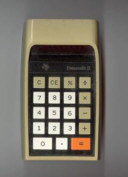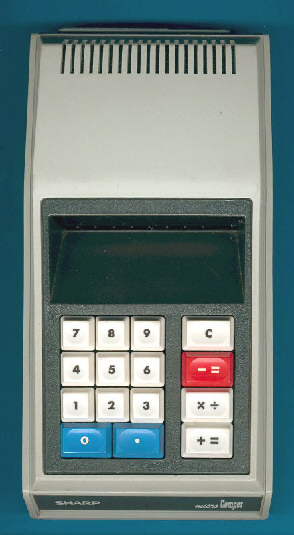
DATAMATH CALCULATOR MUSEUM
 |
DATAMATH CALCULATOR MUSEUM |
Sharp QT-8D
| Date of introduction: | October 1969 | Display technology: | Fluorescent |
| New price: | $495 | Display size: | 8 |
| Size: | 9.8" x 5.4" x 2.8" | ||
| Weight: | 3 pounds 3 ounces | Serial No: | 151087 |
| Batteries: | Date of manufacture: | mth 07 year 1971 | |
| AC-Adapter: | 220 V | Origin of manufacture: | Japan |
| Precision: | 8 | Integrated circuits: | Rockwell NRD2256, AC2261, DC2266, AU2271, CG1121 |
| Memories: | |||
| Program steps: | Courtesy of: | Joerg Woerner |

 If
we trace the Timeline of calculating device starting from the early abacus and
the Napier bones to the 20th century we get some important milestones:
If
we trace the Timeline of calculating device starting from the early abacus and
the Napier bones to the 20th century we get some important milestones:
| • 1820 The Arithmometer • 1874 The Ohdner calculator • 1884 The Comptometer • 1948 The Curta • 1960 The first electronic calculators based on vacuum tubes • 1964 The first transistor based calculators • 1965 Texas Instruments started the Cal-Tech project leading to the first hand-held calculator prototype • 1969 Sharp introduced with the QT-8D the first calculator using LSI (Large-Scale-Integration) ICs manufactured by the Autonetics division of US company Rockwell Electronics • 1970 Sharp introduced its first battery operated desktop calculator QT-8B • 1970 First battery operated, handheld calculators: Busicom LE-120, Canon Pocketronic, Sanyo ICC-82D and Sharp EL-8. • 1971 First portable, battery operated calculator using a "Calculator-on-a-chip" appeared with the Bowmar 901B |
Sharp Electronics Corporation introduced in October 1969 with the QT-8D desktop calculator and immediately wrote history: This engineering marvel is recognized as the first calculator using Large-Scale-Integration (LSI) Circuits. A later version of the QT-8 (the QT-8B from 1970) included a rechargeable battery pack in order to make it portable. It is very similar to the first "really" portable, battery operated calculator, the EL-8.
 Dismantling a Sharp QT-8D manufactured in
July 1971 reveals an
impressive design similar to the later EL-8 using one printed circuit board
(PCB) for the integrated display drivers and display module. Learn how to
decipher the
151087
Date code hidden in the
serial number of the pictured calculator.
Dismantling a Sharp QT-8D manufactured in
July 1971 reveals an
impressive design similar to the later EL-8 using one printed circuit board
(PCB) for the integrated display drivers and display module. Learn how to
decipher the
151087
Date code hidden in the
serial number of the pictured calculator.
 The display itself makes use of individual Itron fluorescent tubes with the odd trademark segmentation of early Sharp calculators.
The display itself makes use of individual Itron fluorescent tubes with the odd trademark segmentation of early Sharp calculators.

 An additional printed circuit board (PCB) hosts the brain of
the calculator - the famous Rockwell chip set based on 4 larger Integrated
Circuits (ICs) labeled NRD2256, AC2261, DC2266, AU2271 and a smaller clock driver labeled CG1121.
An additional printed circuit board (PCB) hosts the brain of
the calculator - the famous Rockwell chip set based on 4 larger Integrated
Circuits (ICs) labeled NRD2256, AC2261, DC2266, AU2271 and a smaller clock driver labeled CG1121.
Read more about Sharp Corporation’s Calculator Innovations.
If you have additions to the above article please email: joerg@datamath.org.
© Joerg Woerner, December 5, 2001. No reprints without written permission.